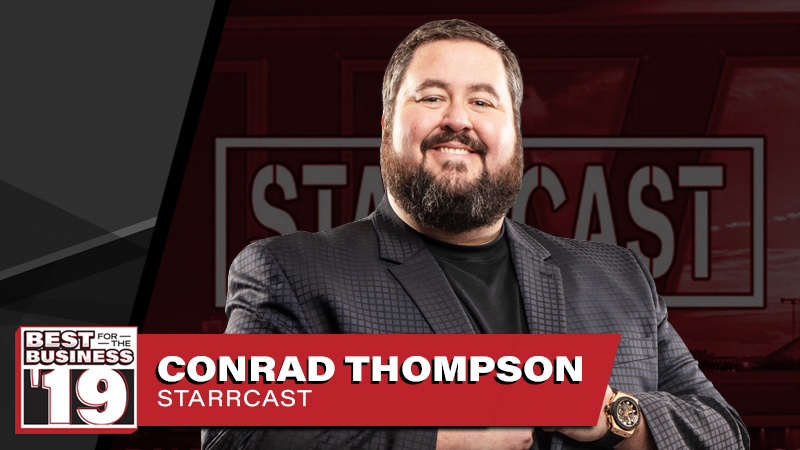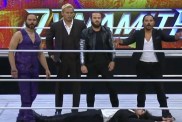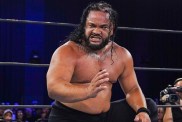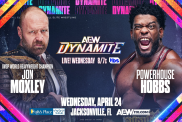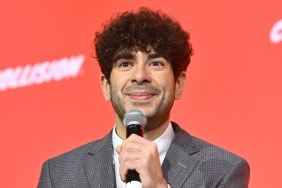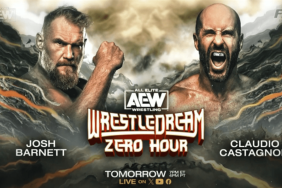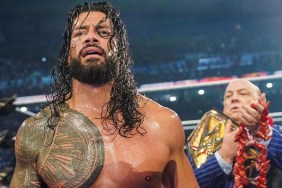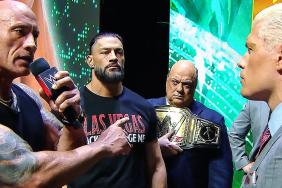Conrad Thompson changed the way fans attend wrestling conventions and made a big mark in 2019 with his Starrcast events hosted around the country. Various fan fests have been run with success for many years, including WrestleCade in North Carolina and WWE’s WrestleMania Axxess sessions being held annually, but Thompson brought new energy to the convention circuit, hosting three major events in 2019.
Thompson initially got the idea for Starrcast after attending the NWA Legends Fanfest in Charlotte, North Carolina, which is no longer active after the promoter decided to stop running those events. When ‘All In’ was created, Thompson saw his chance to bring back his own fan event run in conjunction with the (then) one-off show. All Elite Wrestling’s birth gave him a chance to run events that not only featured wrestling legends but tomorrow’s stars, as well as unique and candid stage shows that have become a trademark of the brand.
“What we’ve tried to do is close the gap. For a long time in wrestling, there was the imaginary and very real guardrail where it’s talent on one side and fan on the other. The reality is before these guys were talent most of them were fans, almost all of them. We’ve closed the gap and I wanted to involve all of my friends who supported me in that process, so Tony Schiavone is really good friends with Dave Silva in real life,” Thompson said, “Bruce Prichard and Eric Bischoff, same thing. They’ve all developed relationships with one another because together we can create something that is more inclusive, feels unique, special, different, and we’ve changed the approach, I think. And it all started with the decision that we wanted to remove that imaginary guardrail and let’s all do something fun together.”
With various “con” events popping up more and more, Thompson recognized the convention circuit is prospering and praised WrestleCon and WrestleCade, and hopes Starrcast would be looked at on the same level.
“I don’t think that there’s such a thing as too many good options for wrestling fans. There’s so many things going on that I’m glad the convention piece of the business is growing as well.”
Before Starrcast was an idea, Thompson found success owning and operating 1st Family Mortgage in Huntsville, Alabama, but wrestling fans have come to know him for his resume in the podcast world. Thompson became friends with WWE Hall Of Famer Ric Flair, who had recently lost his son Reid, and while they initially started as drinking buddies Thompson says it was Flair’s idea to have him on air and they knew they were on to something after the first show.
“We became really, really good friends and he had the opportunity to do a podcast with CBS and he asked me to come in the first week to just ask fan questions. I jumped at the chance to do it that,” Thompson said, “and at the end of the episode CBS dug it, he dug it, and it became an accidental podcast.”
Following their first podcast together (Woooooo! Nation), the pair moved on to “The Ric Flair Show” on MLW Radio, and Thompson now hosts five different podcasts that are some of the most popular in wrestling. Thompson says the secret to his success is that he still approaches shows as if he were a listener too, and a consistent schedule helps balance his two worlds and keep things moving.
“I still approach all of the shows as if I’m the listener and that formula has worked for us. I think I’m uniquely qualified to know what wrestling fans want to listen to because I’m a wrestling fan. I’m a consumer so I’m still actively invested in the product, putting my money where my mouth is. As far as the juggling of the schedule, that’s kind of really easy if I’m honest. I’ll tape [Grilling JR] after work on Monday, I tape ‘Arn’ after work on Tuesday, I tape [Something To Wrestle] with Bruce Prichard on Wednesday or Thursday,” Thompson said, “and then I tape with Tony or Eric on Friday or Saturday morning, and sometimes those rotate if Tony has a football game. I’ve been able to keep that schedule fairly consistently and that allows me to have a ‘regular’ 9-to-5 work schedule and still be able to do all of the podcasts through the week as well.”
With five shows and a mortgage company to run, Thompson has quite the workload to take on but he credits his production team and friends for why it all works.
“Joseph Feeney is the guy that takes care of all of our post-production editing, putting music beds in, leveling the show and uploading it. Dave Silva is really my right-hand man, doing graphics for the shows and handling a lot of logistical details, scheduling. [Dave] Hancock helps out with a lot of our social stuff, especially when it comes to Starrcast. Steve Kauffman handles our YouTube channel,” Thompson noted, “so we’ve evolved to where we’ve got a real team of folks who are helping keep the train on the tracks, and I use my Twitter group of friends which was essentially my sounding board.”
“So when I have what I think is a good idea I run it past the group and get a thumbs up, thumbs down. You hear some of those names creep out on the shows now and again like Jeff Jewett of DooDooTrucking.com or Super Dave Miller over in Mississippi, Mark Nelson, Eric Rottencrotch—I’ve got a host of those friends, including the guy who helps us source all of the venues for Starrcast, Scott down in Jacksonville. So it’s a group of wrestling friends who work on building something together and we’ve had a lot of fun doing it.”
Thompson says he’s come up with ideas for panels and gauges feedback, noting that the group tweaks things and makes his ideas better. He called Chris McDonald of Canada the “secret sauce” and an “unsung hero” of their team, predicting he’ll be working for a major wrestling promotion sooner than later due to his graphic and video work. He added that McDonald makes them look like they’re on a huge scale.
THE BEST IN THE WORLD IS COMING TO #STARRCASTIII
#STARRCASTIII returns HOME to #FITETV, LIVE FROM CHICAGO!
TOMORROW!
#FITE will have Starrcast available for pre-order!@CMPunk @HeyHeyItsConrad @StarrcastEvents pic.twitter.com/vj8BFeZyfG
— FITE (@FiteTV) July 19, 2019
—
Following his run in WCW, Tony Schiavone left wrestling and found a career broadcasting in sports radio, with Schiavone himself thinking wrestling was “done” with him. Thompson ended up pulling Tony back into the world of wrestling with their podcast “What Happened When” and Thompson says he’s very proud to help get Tony—and “Something To Wrestle” co-host Bruce Prichard—back where they belong.
“It’s Bruce and Tony being back where they belong with the sport they love the most, the business they love the most, the companies they love the most, people they love the most, making the most money they’ve ever made, when just a few months prior to me convincing them to do a podcast they thought wrestling was done with them forever and it was in the rear-view mirror and it was all in the past. They thought wrestling was done with them,” Thompson said, “so they were done with it, and now to see it come full circle, and not just be back in it but be at the highest level, highest that they’ve ever been and doing really well, man, that’s just so exciting. I was really glad that we were able to put it together and Tony coming through the tunnel on the debut episode of AEW Dynamite on TNT, before the show went live, there’s a huge ovation and fans are chanting his name, I was so glad that I was able to be there ringside to see it all. It was one of the proudest moments in my wrestling fandom for sure.”
Part of the formula for success on Thompson’s shows has come from his use of Dave Meltzer’s archives of the Wrestling Observer Newsletter, with him taking on the role of fan/subscriber while grilling his co-hosts and getting their take on what was reported and what really happened. Bruce Prichard and Eric Bischoff most often provide the most colorful retorts to Meltzer’s reports, and criticisms of his work have come from more people than those two. Thompson has used other outlets such as the PWTorch to provide context on his shows but cites Meltzer’s work as being on a higher level of anyone. He says Meltzer might get a bad rap but so does anyone that’s successful, and he says more people probably trust Meltzer than his detractors would want you to believe.
“Dave Meltzer is the Cal Ripken of wrestling journalism. He’s the Iron Man. He’s been doing it longer than anyone else, and he’s done it at a higher level than anyone else. No one has done it as well, as long, as he has. To say ‘oh, he gets a bad rap’—so does everyone that’s successful. The bad rap comes from—let’s go back a few years, and even now in some circles—‘Bruce Prichard has a bad reputation.’ Well, Bruce Prichard also has the most downloaded podcast in the industry, so you can’t say he’s got a terrible reputation,” Thompson said, “but also more people listen to him than anybody else. Howard Stern had a terrible reputation and he also had more downloads and more listeners than anyone else, so I don’t buy into the theory that more people dislike Dave Meltzer than like him, I think more people trust Dave Meltzer than anyone else.
“Yes, there are some new kids on the block—I’m very close with Mike Johnson [of PWInsider], but Mike Johnson was not a resource and someone you could look back and read back in 1988. You didn’t have a resource that was in the game as long and as well connected—for decades now—there’s not a lot of wrestling journalists who could pick up the phone and call Ric Flair or Vince McMahon or anyone in between, but Dave Meltzer can. I don’t think the criticism of Meltzer is totally fair. There’s lots of rumor and innuendo in the business because it’s such a political space, it’s unlike any form of entertainment I’ve seen—misinformation, angling, politicking—it’s the very clandestine nature of wrestling and everyone wants to be ‘working’ someone else.” Thompson said. “There’s always an angle to everything that comes out and I don’t really think the criticism of Meltzer is fair. I know I get a lot of that from my co-hosts but I would argue that by and large, he’s right much more than he’s wrong. Sometimes things change, but sometimes he’s been fed information incorrectly because someone had an agenda when they gave him that information. I hope that listeners to the podcast—well-adjusted adults—understand that that exists everywhere. The exact same thing could happen in American politics and you will see it two totally different ways on cable news outlets.”
Ever since AEW announced they were a full-fledged promotion with touring and television interests, a large number of fans and media have stated pro wrestling is entering the biggest “boom period” we’ve seen in nearly twenty years. While it may be true that there is more interest and money in wrestling than there has been in years, that doesn’t necessarily translate to more fans. Thompson says he can see wrestling is doing well financially, but ratings and attendance are down over the years. He says the fanbase might be smaller and sounds optimistic when noting it’s one that’s more passionate and engaging than ever before, but says there’s still some work to be done to get the casual fan back into wrestling.
When asked about how we change that and all of the discussion about numbers and business, Thompson said ”who cares?” and said it might sound silly, but wrestling fandom has changed where it used to be about enjoying it because you liked it but now it feels like a lot of fans want to gauge the opinion of others before reacting themselves.
“I really like Mance Warner. There’s an indie name—Mance Warner is not a name that a lot of people have on their radar right now but for whatever reason I like him. I was a fan of MJF before AEW was a thing—then I got to meet him and realized what a jerk he was in real life. Now I wish I had it all back, and I thought he was a great character until I realized that’s just him in real life. But the reason I’m saying all of that is because I never cared what James Gandolfini, the guy who played Tony Soprano, made per episode or what the ratings were. I just knew I loved Tony Soprano, and if I’m being honest with you,” Thompson quipped, “I probably watched multiple years before I knew his real name was James Gandolfini. I didn’t need to know all of that to enjoy the show. I don’t need to know any of that or how much [wrestlers] make or what viewership or the gate was for me to enjoy it, but I think because we’ve peeled the curtain back so much as wrestling fans through the access of newsletters, social media—everyone becomes like a half-assed business analyst.
“Every now and again I just want to watch wrestling to enjoy it. The stuff that I enjoyed the most is the stuff that I watched when I knew none of that. I don’t know what it’s going to take for there to be another big boom but I know what it’s not going to be, and that’s talking about ratings and gates. My dad is the most casual fan ever and he knows when something’s cool and when he likes something, but he doesn’t know what everyone’s contract status is or what the quarter-hour is. He’s never brought it up nor does he care because that’s not the way he enjoyed television. My dad has never poked his head in and said ‘hey, did you see that Cowboys game last night? It got a 23 rating.’ No! He’d say ‘did you see that Cowboys game last night? What a dumbass decision to go for it on 4th down. I hope they fire the coach.’ But he’d never say it was good because the rating was good, or ‘I hope they put more Cowboys games in primetime because the ratings were good.’ The way we enjoy wrestling has to change.”
Thompson says despite their faults, social media apps are an overall positive and make hobbies more inclusive where it helps people find more content, not just in wrestling. He says the way people talk and enjoy wrestling needs to change because you can find new things, but the business end shouldn’t matter to a fan. He added that he will discuss those things on one of his podcasts to analyze business decisions from a co-host or otherwise, but if he’s just watching at home none of that matters.
Related: Best For The Business: 2019’s Most Influential People, Promotions and Brands In Pro Wrestling
A fifth Starrcast event is not currently planned at this time but the brand has left a lasting impression and fans are still waiting in anticipation to see if and when another convention is announced. With the end of each event, Thompson says he was glad it was over due to how daunting it was and swore he wouldn’t do another event, but ended up running three more after the first one in 2018 in Chicago. When asked about the legacy of Starrcast, Thompson says it was an idea that became a much bigger thing, and that he sees it as “an opportunity to meet your favorite stars of today and sprinkle a little nostalgia on it.”
He noted that some fans might not watch AEW but it’s their first chance to see The Great Muta and Jim Crockett, and maybe they discover AEW or something new along the way. In regards to Crockett’s appearance in Baltimore, he said it’s probably the first, and possibly the last time fans would ever get a chance to meet the former promoter in that setting.
“I hope it was the most unique wrestling convention they’ve ever been to. What makes us unique is that we have the stage show component—I didn’t want to just have folding tables and photos and autographs. There’s nothing wrong with that but I wanted it to be an event where you got something else to do while you’re there. It’s not just to collect autographs, because I’m not typically an autograph collector,” Thompson said. “I want to hear the stories, I want to see the experiences.”
“When you come to Starrcast, you have an opportunity to go to Tony Schiavone’s birthday party. Legitimately, a lot of his friends and family will be there and they’ll do a roast, it won’t air on TV, but you get to see these guys in real life and that’s pretty cool. The next day, you’re going to hear from guys that you maybe never heard from—Barry Horowitz, Dwayne Gill, George South, Bobby Starr, some of the enhancement guys that have just as interesting stories as the top guys did, but they’ve never had a platform to do it. There’s so many fun things that happen here that happen nowhere else.”
Read More: Pro Wrestling Tees’ Ryan Barkan: The Man Behind The Merch Empire (WZ Interview)
